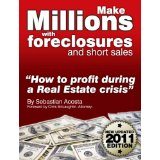Bottom Feeding in Real Estate
I was driving through a prominent San Francisco neighborhood last Sunday, looking for a McMansion open house. When I came to one key intersection there were more than a dozen signs directing me to competing offerings. What a joke. And the agent told me that market conditions were gradually improving! It looks like current and former millionaires are in a rush to unload their properties before then next recession hits, noticeably adding to the already bloated inventory of unsold homes.
I heard this morning that the Federal Housing Authority, the government agency that insures residential real estate loans, has lost nearly all its cash reserves to cover losses. Since last year, these reserves have fallen from $4.7 billion to $2.6 billion.
Federal law requires it to maintain a reserve of 2% of the $1.2 trillion of loans it currently has outstanding. Reserves will fall from 0.5% to 0.24% by 2012. Independent analysts say that the agency is underestimating loan losses by at least $50 billion.
That means the FHA will need a bail out next year, and therein lies the problem. In its current gridlocked mode, it is highly unlikely that congress will approve the multibillion dollar refunding of a controversial federal agency. The ?let the chips fall where they may? crowd seem to have the upper hand. The FHA currently insures one third of US mortgages, up 560% since 2006, largely through the demise of its private competitors. No insurance means no loans. For you and I that means lower home prices.
The FHA specializes in loans with less than 5% down. With home prices in a six year nosedive, more than half of these are now underwater. With $30 billion in liquid capital and $1.2 trillion in outstanding guarantees, it now has a 43:1 leverage ratio. Sound familiar? The shorthand for this is that the FHA is basically a government version of Lehman Brothers begging to happen.
Even while congress is starving the FHA of new funds, it is asking the beleaguered agency to stick its neck out even more. Conforming loan limits went from $729,750 down to $625,000 on October 1. Congress wants to return to old limits. This would be a big deal for homeowners in the expensive states of California and New York. But again, action is needed.
In the end, I never made it to the open house I was looking for. Instead, I tripped across another house that was twice as nice for a third less money. With all of these cutthroat price reductions going on, continuing to rent sounds like a really good idea. The taxes, insurance, and maintenance on the last place added up to more than my current rent, and that is not even accounting for a mortgage interest expense, it I could get one.
I?ll tell you the title of the next book that I am going to read. Make Millions with Foreclosures and Short Sales: How to Profit From a Real Estate Crisis can be bought at Amazon by clicking here.




